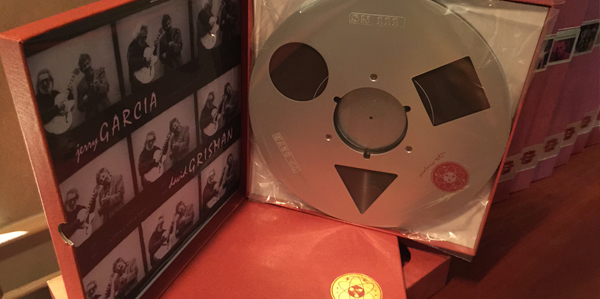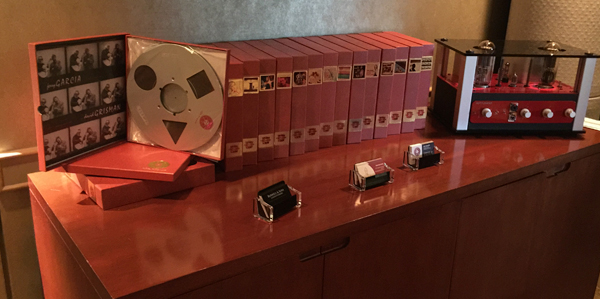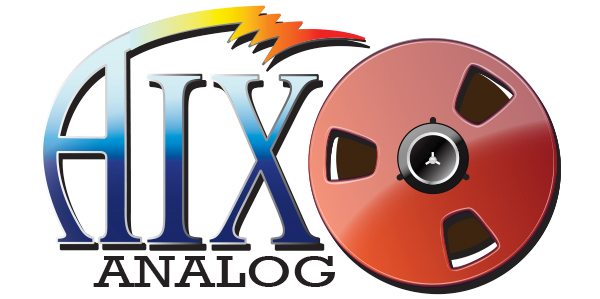The Analog Tape Adventure
I’ve very aware of the work that Paul Stubblebine and his partners are doing at The Tape Project but I hadn’t actually seen or held any of their products. Well, I did on Saturday in the same room where Bottlehead and Burwell & Sons were exhibiting. They are gorgeous! The custom reels, the elegant boxes, the additional information is very well done. I was impressed. Of course, these are premium products for the elite few that want and can afford to support a reel-to-reel habit. A gentleman came by the AIX table on Saturday afternoon with one of the tapes, so I asked him whether he might be interested in the Christian Jacob “Beautiful Jazz” tapes that I will be duping at the end of the month. He expressed interest and I heard from him today via email about that purchase and his interest in the LA4 “Just Friends” tapes as well.
Honestly, I’m very surprised at how many reel-to-reel fans have contacted me about getting copies of these two products. I’m going to have a very long weekend of copying and proofing the tapes I’m producing. I have sold 11 albums on reel-to-reel tape. I’m sorry that I can’t provide custom aluminum reels or beautifully printed custom boxes. I do have an AIX Analog logo that I might tape to the front of the RMG International tape boxes. I actually spent a couple of days working on a new look and feel for the “analog” part of me. Here’s what I came up with.
Figure 2 – The AIX Analog Logo
This project has taken on a life of its own. I’ve been in touch with each of the customers and confirmed their interest and payment. The shipping is going to be a new experience, which my wife will figure out. I reached out to Rodney at the rental company. He’s leaving for Europe the first of September so I have to pick up the deck, transport it here to the studio, do an IEC EQ alignment, and do the transfers on the last weekend of the month. It reminds of the weekends when I rent an HD-CAM player for ingesting video. There are simply numbing hours of duplicating or digitizing media from one format to another. Trust me, it’s not a lot of fun. In fact, it may put me off of the “Beautiful Jazz” performances if I have to listen to them dozens of times in a short period of time. I’m sure I’ll be toast by the end of the process…and then I have to truck the deck back to the west valley. Digital is WAY easier!
+++++++++++++++++++++++++++++++++
My wife and I are headed to Mexico City today to visit our youngest son. He finished his Fulbright research on the urban sprawl of the city in June and has been enjoying the country for the past month or more before starting his first postgraduate school, full time job…in Zurich, Switzerland. He’s a very bright young man and I’m thrilled that he has the chance to explore other parts of the world. I mention this because I’m not sure how great my access to the Internet is going to be over the next week.
If anyone wants to comment on articles this week, it may be some time before I can approve them. I’ll do my best…but this supposed to be a vacation, so be patient.




Enjoy time spent on vacation with family, the most important times of your life.
Will these tape dubs be done from analog or digital masters?
When time allows.
You son will love Zurich! I hope you get to visit him there often. One great city!
It is well known that 96 kHz (DVD Audio) recordings sound better than 44.1 kHz (CD) recordings. Most people believe that this is due to the presence of ultrasonic information being audible even though the best human hearing is limited to 20kHz. What is not well known is that 768 kHz recordings sound better than 384 kHz. 768 kHz recordings cannot sound better because of information above 200 kHz being important – simply because musical instruments, microphones, amplifiers and loudspeakers do not work at these frequencies nor can we hear them. So if it is not the extra bandwidth that is important, why do higher sampling rates sound better? The answer is not being able to hear inaudible supersonic information, but the ability to hear the timing of transients more clearly. However, 44.1 kHz sampling can be capable of accurately resolving transients by the use of digital filtering. Digital filtering can go some way towards improving resolution without the need for higher sampling rates.
I could dispute every sentence of this comment. Not dispute with an opinion, but with facts.
Grant, I’m not sure where Jay’s comments come from…but I’ve decided to pass on making comments.
Who would had thought there may be a market for audiophile open reel tapes in 2015? I sold my open reel deck years ago.
Mark…
Given these dub tapes are taken from tape masters and transferred to tape…to create a great sounding copy; is anyone going to do an equivalent digital transfer. By equivalent, I mean transfer form the Master Tape to a digital format that gives an equal reproduction of the Master?
Why? Cos’ I’d pay for that digital copy, rather than a R2R Tape copy, it is vastly more reliable and lasting medium.
Perhaps you might point me towards HD Tracks or similar…but no, I don’t find those are equivalent recordings to the R2R tape results.
Who does provide such digital recordings and what format do they require for such successful listening results, I wonder…? Do you?
Btw, I grew up sitting next to my Dad as he used his Technics R2R to record ABC FM Stereo radio (shhhh copyright’ists), and play commercial R2R tapes in Melbourne Australia. I sold his player in 1989, when he passed away. I don’t really wish to go back to this format…I’d much much rather go forward and plug a great digital source into my Finale 829B Special amp, sit back and smile…
Oh and having been to Zurich, I second the commentary on the beauty of this country and the importance of catching these moments with your son. I’ll wait…
John, thanks for the comments. I hadn’t thought of making high-res digital transfers of the analog masters I have. But if I have time, that might be interesting. In reality, that is what virtually all of the content available from the major labels is…transfers to high-resolution bit buckets from analog masters. Sometimes they are remastered and sometimes not.
All of my AIX recordings are recorded at 96 kHz/24-bit PCM. I do plan to make a couple transfers from the tapes I have to 96/24 and see if the customers who love analog tape will notice a difference from the 2nd generation copies they’ve purchased.
I’m writing this on my final day in Mexico City…then we’ll visit my son in Zurich in the late fall.